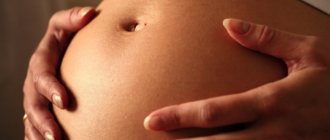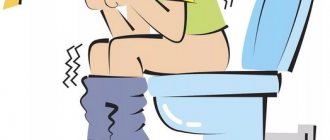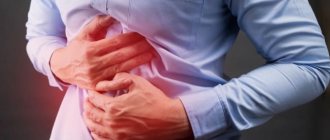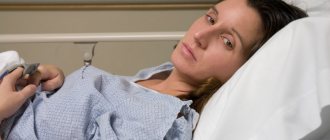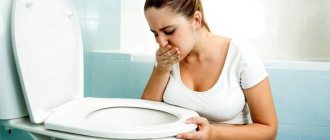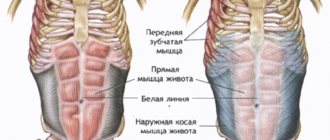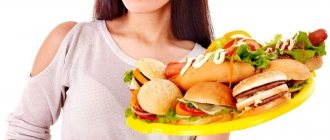Bloating and belching probably occur in every person who has overdone it at the dinner table. But not every bloating of the stomach after eating has the same causes and treatment. What they may have in common is a disruption in the functioning of the organ due to poor nutrition.
Causes
If the peritoneum is swollen, the reason for this is, first of all, poor nutrition:
- overeating leads to excessive stretching of the walls of the stomach, which is reflected by a slowdown in the movement of food through the digestive system and its emptying, leading to stagnation;
- consumption of chilled, cold, frozen foods leads to increased gastric activity, rapid digestion of food, which is manifested by loose stools;
- the habit of eating only when a person is hungry is considered harmful, since long breaks between meals make digestion difficult due to the stomach being full of food;
- the habit of eating a large dinner before bed, as a result of which the gastrointestinal tract does not rest at night, affects the feeling of heaviness;
- changing the usual daily diet with abundant feasts, which overload the digestive system, and it cannot process such a volume and release the required amount of hydrochloric acid;
- fried, spicy, sweet, foods rich in light carbohydrates irritate the tract, causing bloating.
Tonic alcoholic drinks, carbonated drinks with artificial colors, coffee and kvass are also irritating factors. The latter consist of gas-forming components that affect digestion.
A disturbed nervous system and frequent overwork affect bloating and gas formation no less than overeating. Mental stress leads to belching and the development of a feeling of overcrowding.
Age-related changes lead to a slowdown in digestion processes and a deterioration in their quality. This is fraught with bloating, nausea, and hiccups.
Smoking impairs blood circulation in the digestive tract, disrupting its wave-like contractions, which affects the uniform movement of consumed food.
Obesity is also a harmful factor when gases distend the stomach, often causing nausea and shortness of breath.
Interesting! Why does the stomach swell during menstruation and what to do?
How to get rid of bloating?
Before treatment, it is necessary to consult a specialist, undergo an examination and identify the cause of this condition. Then, you can begin therapy, which includes taking medications, using traditional methods and adjusting your diet.
Medications
Tablets are selected taking into account the cause of excessive gas formation.
Basically, these are carminatives and drugs that restore microflora, namely:
- Enterosorbents. With the help of these drugs, harmful substances are removed from the body. These medications have a gentle effect and lead to quick results. The most popular are: Polysorb, Filtrum, activated carbon. They successfully solve the problem of waste rotting.
- Enzymes. They have a wide spectrum of action. These include: Festal, Oraza and Abomin.
- Defoamers. Gases are small bubbles that settle as foam in the intestines. This foam stretches the intestines and causes pain. To prevent this, the following drugs are prescribed: Espumisan and Disflatil. They quickly extinguish the foam.
- Probiotics. Prescribed to relieve bloating after prolonged use of antibiotics. The most effective: Linex and Bifidumbacterin. These products contain lactic acid bacteria, which restore microflora and normalize digestion.
If, due to bloating, your blood pressure drops sharply, bleeding from the anus appears, or you lose consciousness, you should urgently call an ambulance. Immediate hospitalization is required and surgery will most likely be required.
Folk remedies for constipation
The most effective herbal component that eliminates constipation and flatulence is dill seed.
A medicinal drink from these seeds is prepared in two ways:
- Pour one tablespoon of crushed seeds into a glass of boiling water. Leave for 20 minutes and strain. Drink 6 times a day 15 minutes before eating.
- The second method of preparation is similar, but the broth needs to steep for 2 hours. Children drink 1 tablespoon, and adults drink 100 ml.
To eliminate bloating, a decoction of “coltsfoot” is often used. It also relieves inflammation in the intestines. Preparation: 250 ml of boiling water, 2 tablespoons of plant leaves. The decoction is infused for 30 minutes. Take 1 spoon before meals.
Recipes for cholecystitis
With this pathology, the gallbladder is affected. With a mild form of the disease, you can get by with folk remedies.
Recipes:
- Mix in equal proportions: carrots, cabbage juice, honey and cognac. Place in a dark place. Take 100 g before meals.
- Add a spoonful of dry plantain to 200 ml of boiling water. The finished infusion is drunk in small sips.
When your stomach is swollen, drink cabbage juice
By consuming this juice, you can not only eliminate bloating, but also cure stomach ulcers. Cabbage salad is very healthy, but not more than 100 g. By the way, you need to chew the cabbage very carefully.
When you start drinking cabbage juice, you should start with 1 spoon. Then, the amount of juice is gradually increased to a single dose of 100 ml. Treatment is carried out for 30 days.
St. John's wort tea for bloating
This tea is often used in the treatment of the gastrointestinal tract and to relieve inflammatory processes. Pour 200 ml of boiling water over a spoonful of herbs and leave for 10 minutes. You need to drink a glass three times a day for 2 weeks.
It should be noted that long-term use of this tea can cause exacerbation of gastritis.
Diet
If your stomach is bloated after eating, you must adhere to a diet.
Exclude from the diet:
- Floury.
- Products with a high content of fiber and proteins.
- Yeast products.
- Alcohol and carbonated drinks.
It is better to give preference to buckwheat or millet groats. Milk must be diluted with water.
Symptoms
Long-term disorders of the digestive processes in adults are accompanied by periodic abdominal pain, nausea and vomiting, and bad breath. Added to the above-mentioned symptoms are sudden weight loss, increased body temperature, and painful sensations in the chest. If failures of the digestive system occur frequently, this is fraught with poisoning resulting from poor digestion.
Important! The present symptoms in the form of constant bloating after eating are observed not only in adults, but also in children. At this age, provoking factors are irregular meals, quick games immediately after meals, or an afternoon rest on the bed.
Diagnostics
The doctor must interview the patient and also perform palpation and percussion procedures on the abdomen. At the next stage, instrumental diagnostic methods are used.
The following studies will be required for a medical report:
- Ultrasound of the liver;
- coprogram (stool analysis for the presence of particles of undigested food);
- biochemical check of the level of triglycerides, leukocytes, hemoglobin (blood test);
- bacteriological analysis of feces and determination of the volume of lactoflora;
- assessment of enzyme activity in duodenal contents.
The effectiveness of eliminating flatulence directly depends on the accuracy of the gastroenterologist’s determination of the nature of the disease.
Treatment
Conservative medicine still cannot find a universal therapy against peritoneal bloating, so various medications are used in treatment. For example, the main means for treatment are No-Shpa, Papazol, Meverin, which relaxes the intestinal muscles.
Espumisan, Infacol, Bebinos are recommended to be taken for flatulence; the latter can be given to young children.
Mechanical blockage of the intestine
This condition is characterized by pain (sometimes hardening is felt in some part of the intestine), stool retention, and the patient may not pass gas.
The pain can vary in intensity, the nature of the sensations and their localization can be clear, but not always. The cause of mechanical blockage is constipation (it is caused by various factors, from poor nutrition to pathologies in the development of the digestive organs), tumors, etc.
For an accurate diagnosis, you must consult a doctor. If the problem is caused by ordinary constipation, then performing a cleansing enema and further proper nutrition will help solve the problem.
If the matter is something else, then a medical examination will be needed.
Tumor
Intestinal tumors of various origins lead to destruction of the intestinal walls. At the initial stages, the pathological process is accompanied by mild episodic pain. Over time, the pain syndrome increases and is not suppressed by analgesics, accompanied by lack of appetite, weight loss, weakness, nausea, vomiting, heartburn, and defecation disorders. There may be blood, mucus and pus in the stool. In this case, the abdomen is hard and painful on palpation.
If you have a disease, the symptom of which is a hard stomach, you should contact a medical facility. Only a doctor can prescribe the necessary treatment. Self-medication and unsystematic use of medications can worsen the condition and lead to serious consequences.
Other ailments
However, all of the above are not the only cases requiring urgent treatment. There are other ailments that require immediate surgery or special medications.
Appendicitis often has a variety of symptoms that can be vague. Although the classic description of pain on the right side, nausea and fever is most common, some other symptoms may occur.
It is better not to guess and not to self-medicate, but to consult a doctor.
If the appendix is not removed in a timely manner, peritonitis may begin, and this is much more dangerous, as there is a risk of death.
It happens that problems arise due to inflammation of the pancreas.
Acute pancreatitis also causes pain that begins near the navel and gradually spreads further. All this is accompanied by vomiting and bloating, in some cases diarrhea. Acute pancreatitis is treated under the supervision of a doctor.
Also, the cause of such conditions can be inflammation of the gallbladder, that is, acute cholecystitis. Among other things, it is also characterized by elevated temperature, and the pain can radiate to the heart area.
A strangulated hernia is very dangerous.
As a rule, those who have it pose the greatest danger - both doctors and the Internet inform about this. Symptoms of strangulation are sharp pain in the area of the hernia itself or wider; when pressing, the hernia cannot be reduced. In this case, urgent medical attention is required.
As a result of an ulcer of the stomach, duodenum, diseases of the gallbladder, liver, or spleen, perforation (if we are talking about hollow organs) or other damage may occur, resulting in blood or any substances entering the abdominal cavity. A person may vomit blood, which also gets into the stool and turns it black.
What to do if your lower abdomen is painful and hard
It is not recommended to self-medicate, especially if this condition occurs frequently or is constantly present. Consult a gastroenterologist for advice. The doctor will conduct a diagnosis, study the medical history, rule out or confirm the presence of diseases.
Often, diagnosis in children and adults involves the following studies:
Without fail, if the stomach is hard, it is necessary to adjust the patient’s diet. Products that can increase gas formation (cabbage, potatoes, rice, whole milk, etc.) are excluded from the menu. Every day they eat coarse bread, a limited amount of vegetables and fruits, and dairy products.
It is recommended to increase physical activity, and it is not necessary to do exercises in the gym; walking 3 km a day is enough. In the absence of serious diseases characterized by the appearance of a hard belly, changes in diet and lifestyle will certainly relieve discomfort.
Drug treatment for hard belly
- Often, doctors prescribe a whole range of drugs to reduce gas formation. It necessarily includes adsorbing agents - “polysorb”, “activated carbon”, “smecta”.
- Enzymatic drugs are also used - “mezim”, “pancreatin”, “panzinorm”.
- Sometimes drugs are prescribed that replace bile or stimulate its production - “karsil”, “LIV 80”, “allochol”.

